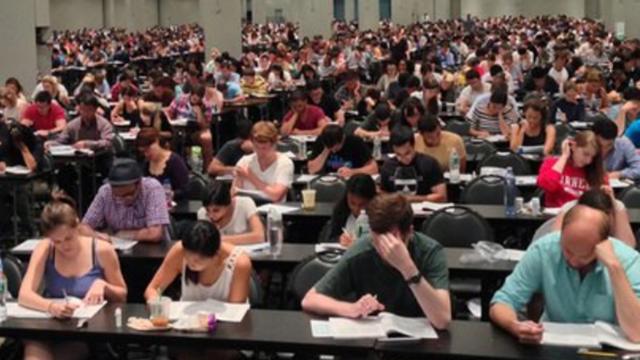California’s Bar Exam Faces Controversy
California’s bar exam has traditionally been a milestone for aspiring attorneys, often regarded as a rigorous and daunting challenge marked by a notably low pass rate. However, the February 2025 examination spiraled into significant disorder, afflicted with technical failures, numerous lawsuits, and a surge of public discontent. Recently, in a remarkable twist, more than 200 candidates previously marked as failures are being reassigned to the passing category following new grading adjustments aimed at mitigating the ensuing fallout.
Significant Changes in Grading Approach
Late last week, the State Bar approved a recalibration that will elevate the overall pass rate from 56% to 63%, significantly exceeding California’s historical average of merely 35%. Under this revised scoring protocol, applicants who nearly passed and received a second review of their written responses will now be rewarded with the higher score for each question instead of the previously employed average score method.
Implications for Candidates and the Legal Community
This decision has a profound impact for the 230 candidates who are now granted a vital opportunity to advance in their legal careers. However, this swift adjustment poses critical implications for the integrity of the legal system and raises concerns among the public who depend on having qualified legal representation. The debate ignited by this reversal has become increasingly heated.
Bar Leaders Implement Further Changes
In the wake of the chaos surrounding the February exam, the State Bar has been proactive in implementing a series of remedial measures. Aside from adjusting the pass rate, they have previously sanctioned a lower raw passing score and now contemplate additional adjustments for candidates who could not finish substantial parts of the extensive two-day exam. The bar has also signaled intentions to petition the state Supreme Court to approve statistical scoring adjustments that may enhance certain candidates' performance portions.
Cost Implications and Future Directions
The February exam marked the rollout of California’s hybrid testing format, which combined remote and in-person formats but abandoned parts of the traditional national bar exam used for decades. While the intention was to cut costs by approximately $3.8 million annually, resolving the complications ahead of the upcoming July exam could lead to costs exceeding $6 million.
Concerns Over Integrity and Public Safety
Despite the positive implications for some candidates, the measures have drawn criticism from specific State Bar trustees who express unease over the higher pass rates and the potential ramifications for the public's access to competent legal counsel. The Bar contends it is facing significant challenges in balancing the need for fair solutions while ensuring the integrity of the exam is upheld. Their statement emphasizes a commitment to preventing any actions that might compromise their mission of protecting the public.
This unprecedented upheaval in scoring raises essential questions about the standards necessary for entering the legal profession and the implications for future candidates. The legal community watches closely as additional discussions unfold over the controversial adjustments, with many anticipating possible long-term ramifications on the integrity of the bar exam as we know it.
Bias Analysis
Key Questions About This Article




